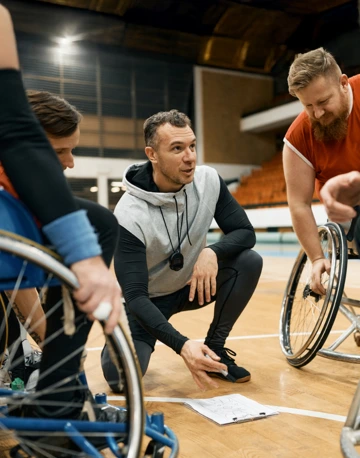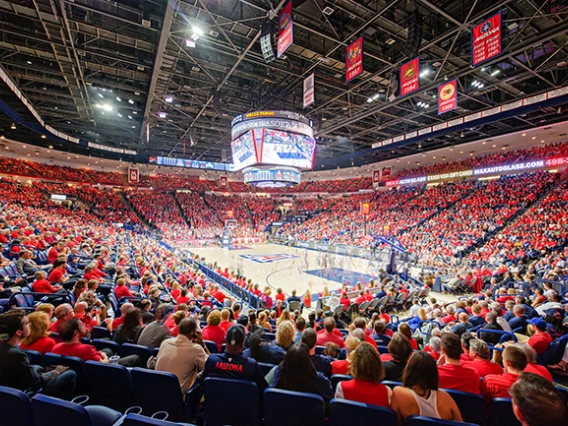Sport and Recreation Leadership
Master of Arts
Quick Facts

Top 1%
of all Higher-Ed
Institutions
- Center for World University Rankings, 2024
#1
In Best Value Among
Arizona's Public Universities
- Payscale, 2024
The sports and recreation industry is a powerhouse, impacting millions and generating billions in revenue annually. It's where passion meets purpose, driving personal well-being, community growth, and economic activity. The Sport and Recreation Leadership (SRL) graduate program equips you to thrive in this dynamic field.
Dive deep into critical issues like equity and justice in sports, policy analysis, coaching strategies, and administrative functions. Dynamic courses led by experienced faculty provide a comprehensive foundation for success.
Gain practical experience and real-world training through internships with businesses, non-profits, or government agencies. Up to six internship credits can count towards your 30-credit degree. These opportunities, flexible courses, and learning experiences rooted in compassion, equality, excellence, and health and wellness prepare you for diverse careers. These include roles in K-12 and youth sports, collegiate athletics, adaptive sports programs, campus recreation, parks and recreation, community organizations, outdoor recreation, sports facility management, and military recreation.
You must have completed a bachelor's degree in any field of study with a 3.0 GPA to apply for the program.
Students can pursue one or both SRL graduate certificates independently. MA students will acquire both graduate certificates along with their degree at graduation.
*Residents of some U.S. Territories may not be eligible. Please see our Eligibility & State Authorization page for more information.
The core curriculum for this program includes:
You will examine current topics and issues within the sport and recreation environment from various perspectives, including philosophy, sociology, psychology, public health, education, and economics/business.
In this course, leadership theories will be combined with real-world advice from current practitioners in the field, along with various case studies, to develop students' personal leadership styles, skills, and competencies.
You will be encouraged to think critically about sport and recreation in broad social contexts, exploring the economic, political, and socio-cultural forces that affect sport and recreation.
This course will provide the theory, methods, and skills needed to facilitate inclusive physical activity programming for diverse and special populations in sport and recreation settings.
This course is designed to equip students with the knowledge and skills necessary to evaluate and assess sport and recreation organizations through strategic data collection and analyses.
You will gain insights into strategic decision-making, financial planning, budgeting, sponsorships, and promotional tactics in the sport and recreation industries.
This course experience is the culmination of an academic journey, providing an opportunity to integrate and apply the knowledge and skills acquired throughout our program to individual students' professional goals.
Outcomes
Skills
Earning your Master of Arts in Sport and Recreation Leadership will build core skills, including:
- Coaching
- Communication
- Critical thinking
- Finance
- Health and wellness
- Human resource management
- Inclusivity and diversity
- Leadership
- Marketing
- Policy analysis
- Program planning
Potential Career Paths
Graduates of the Master of Arts in Sport and Recreation Leadership will be prepared to pursue careers in the following fields:
Graduate Certificates

This certificate program will equip you with the expertise to excel in the field. You'll gain a deep understanding of organizational leadership, policy analysis, implementation, and essential administrative functions such as human resources, finance, and marketing. Learn from experienced faculty who have worked in athletics, coaching, recreation, and physical education.
The course will explore contemporary and future organizational leadership issues influencing the delivery of sport and recreation services in various settings. Emphasis is placed on understanding the structural, human, political, and cultural factors that impact organizational efficiency and effectiveness and the implications for sport and recreation leaders. Leadership theories will be combined with real-world advice from current practitioners in the field, along with various case studies. Developing your leadership style, skills, and competencies will be prioritized to help navigate your current and future organizational positions.
This course will equip students with the knowledge and skills necessary to evaluate and assess sport and recreation organizations through strategic data collection and analyses. We will explore various methods and tools used to evaluate policies, programs, and services to determine whether institutional goals, participant needs, desired community impacts, and stakeholder expectations are being met. The focus will be on policy development and implementation and the related real-world impacts on individuals and communities.
Through case studies and real-world examples, you will develop practical leadership skills in budgeting, fundraising, marketing, branding, and sponsorships. You will also develop an understanding of the financial mechanisms driving different types of sport and recreation organizations, along with the intricacies of marketing strategies to engage fans, sponsors, participants, the community, and other stakeholders. By the end of the course, you will emerge equipped with the knowledge and tools to navigate the complex interplay between marketing and finance in a continually evolving field.

This certificate program provides a deep dive into equity and justice issues, led by faculty with extensive experience in athletics, coaching, and recreation. Gain the practical skills and knowledge to create truly inclusive sport and recreation environments.
The course will examine current topics and issues within the sport and recreation environment from various perspectives, including philosophy, sociology, psychology, public health, education, and economics/business. You will engage with current research and debates on the role of recreation and sport in society, focusing on potential implications for leaders and policy-makers in these fields.
This course will encourage you to think critically about sport and recreation in the broader context of social constructs. We will explore the economic, political, and socio-cultural forces that affect sport and recreation. There will be a particular focus on the role sport and recreation play in creating, perpetuating, and reflecting ideologies and identities associated with gender, class, race, and other identity markers of diversity. More generally, different levels of sport and recreation contexts will be used to discuss the value of centering equitable and inclusive practices and policies.
This course will provide the theory, methods, and skills needed to facilitate inclusive physical activity programming for diverse and special populations in sport and recreation settings. We will explore how to effectively assess and meet the needs of individuals with different types of physical, psychological, and emotional disabilities and challenges, especially in athletic and active contexts. A focus will be placed on applied strategies that include specific coaching techniques and adaptive modifications. You will have the chance to hear, watch, and learn from coaches and experts affiliated with the world-renowned Adaptive Athletics Department, right here at the University of Arizona.











